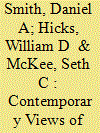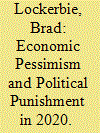| Srl | Item |
| 1 |
ID:
177225


|
|
|
| 2 |
ID:
177235


|
|
|
| 3 |
ID:
177230


|
|
|
| 4 |
ID:
177257


|
|
|
| 5 |
ID:
177213


|
|
|
|
|
| Summary/Abstract |
What are Americans’ views on liberal democracy? Have their attitudes changed since the 1950s? How do their attitudes about liberal democracy shape political behavior, such as vote choice? We replicated McClosky’s (1964) seminal study on a module to the 2016 Cooperative Congressional Election Study. Our exploration of 26 survey questions reveals both continuity and change in Americans’ attitudes toward liberal democracy. Whereas Americans have become more hostile toward some standard democratic procedural rules of the game, we also find that they harbor more tolerant attitudes toward racial and ethnic equality. We subjected respondents’ answers to an exploratory factor analysis, which reveals three distinct dimensions regarding democratic values: elitism, authoritarianism, and racial supremacy. We find that elitism and racial supremacy significantly influenced political behavior in the 2016 presidential election and note that these factors contributed to mass unrest in 2020, exposing fault lines deeply rooted in America’s contentious political history.
|
|
|
|
|
|
|
|
|
|
|
|
|
|
|
|
| 6 |
ID:
177220


|
|
|
| 7 |
ID:
177242


|
|
|
| 8 |
ID:
177249


|
|
|
| 9 |
ID:
177224


|
|
|
| 10 |
ID:
177217


|
|
|
| 11 |
ID:
177252


|
|
|
| 12 |
ID:
177214


|
|
|
|
|
| Summary/Abstract |
Previous studies used pre-primary variables (e.g., endorsements, national polls, and fundraising) and momentum variables from the Iowa and New Hampshire contests to predict presidential nomination outcomes. Yet, races with no elite favorite and no clear frontrunner in polls, such as in the 2020 Democratic race, are more difficult to forecast. We replicate and extend two forecasting models from 1980 to 2016 used by Dowdle et al. (2016) to predict the 2020 results. Our models suggest that Joe Biden may have been a stronger frontrunner than expected but that subsequent models may need to incorporate other early contests, such as the South Carolina primary. Overall, our results also argue that the fundamental factors in winning presidential nominations have remained relatively stable.
|
|
|
|
|
|
|
|
|
|
|
|
|
|
|
|
| 13 |
ID:
177231


|
|
|
| 14 |
ID:
177241


|
|
|
| 15 |
ID:
177245


|
|
|
| 16 |
ID:
177215


|
|
|
| 17 |
ID:
177216


|
|
|
| 18 |
ID:
177227


|
|
|
| 19 |
ID:
177222


|
|
|
| 20 |
ID:
177211


|
|
|
|
|
| Summary/Abstract |
During the 2016 US presidential election, Americans were exposed to an onslaught of disinformation on social media. Many of the most viral posts originated from Veles, a small town in central Macedonia. During fieldwork in Veles, where we interviewed several residents and disinformation creators, we found that the epicenter of this viral phenomenon was Mirko Ceselkoski, an autodidact social media expert, teacher, and mentor to Veles’ fake news operators. We interviewed Ceselkoski and registered and attended his online course—the same course numerous Veles residents took offline. Our research confirms (1) the pivotal role Ceselkoski had in the creation of this industry; (2) the economic motivation driving the fake news disseminators; and (3) the manner in which the mostly young people in their early twenties with little English fluency were able to generate so much traffic and disseminate so much disinformation.
|
|
|
|
|
|
|
|
|
|
|
|
|
|
|
|